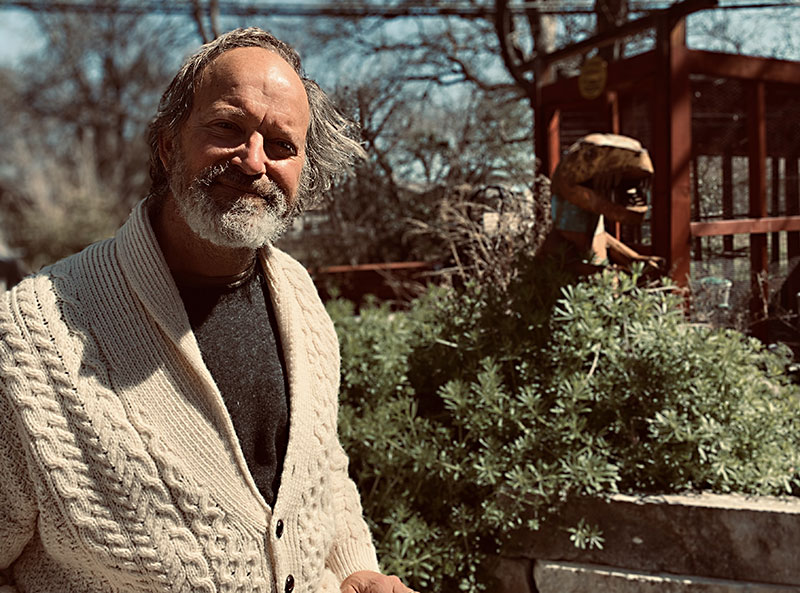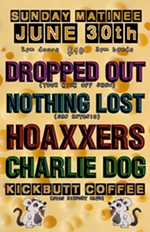Meet UT Math Professor and Spellbinding Songwriter Sean Keel
The seldom-performing educator's fragile voice breathes bittersweet nostalgia
By Jack Corcoran, Fri., Sept. 9, 2022

Wednesday is Song Circle Night at Cheatham Street Warehouse in San Marcos – a nice way of saying "open mic." There are about a dozen songwriters waiting to go on, and one of them is an older man who kisses his wife, leaves a drink on the wooden spool table and walks on stage with the slight huddling of a retired athlete. Gingerly, he sits down, holding his steel string acoustic angled vertically like a classical guitarist.
From the moment he starts to sing, the room of fresh-eyed beginners, peppered with a few veterans and hobbyists, leans in. There's a deep struggle in his voice, which sounds older than his 60 years. It's a voice that's seen empires rise and fall.
Plastic bags are catching wind, they're dancing
Stretching wings as white as wedding gowns
I haven't known for years where you are, and I'm not asking
Revival must be over, the tents are coming down
Taken from the name of a real small-town attraction that failed, "Corn Palace" is an ode to decay, an elegy for the Southern Minnesota farming community of Keel's youth. When Keel sings that the "corn palace will save this town," you know it didn't.
Keel plays another original, reminiscent of Tom Waits at his most wistful and sentimental: "Soup Line," the story of a youthful misadventure that started after his father had passed out.
We went fishing through his pockets, found the keys to the truck
What I hoped would be his wallet was just chew
Cheatham's rapt. The more industrious eyes are trained on Keel's hands, to watch and learn. Once they've been playing guitar for years, most people forget how to play with such sincerity. Some of those in attendance are considering getting a Realtor's license because if a guy this good is still playing open mics, what chance do they have?
But Keel didn't even pick up a guitar until he was 45, as something to do because he couldn't play sports, especially his beloved hockey, like he used to.
And he can't play concerts. Keel has presbyphonia, a thinning of the vocal cords, which he compares to permanent laryngitis.
"I find it difficult to sing more than three songs in a row," he says. He's only played a full set once before, "and I don't think I will again." He also finds it difficult to play guitar without his orthopedic chair for more than a few minutes.
Sean Keel has been a research professor of mathematics at the University of Texas since 1989. "My music isn't very well-known," he says, "but my work in math is quite well-known, to an admittedly small crowd." If you Google "Sean Keel live," the first three videos that come up are lectures about a subject where algebraic geometry informs applications in theoretical physics. Specifically, his field of study is the nine-dimensional Calabi-Yau manifold. "This theory," he explains, "is one of the leading candidates to replace superstring theory as the unified field theory."
You'd think pushing math into the realm of metaphysics would be all-consuming, but Keel's always been writing creatively, encouraged by his mother since he was a child.
"I used to climb up into her lap and ask, like any kid, 'Ma, tell me a story.' She would say, 'Nah, Sean, how about you tell one to me?'"
Keel found out, only in the last few years of her life, that his mother's family had a small band that played in the tiny Irish towns where she grew up. "Her Bruised Hands" is one of several Keel songs inspired by his mother. Keel also has a family band called Bill the Pony, which grew out of the weekly jam sessions he hosts on the screened porch of his house he calls the Breeze Terrace Free Zone. Wife Michelle, daughter Rosie, and son Lukas mix with traveling musicians and other friends to unveil material, compose new songs, and jam out. Keel mainly plays the flute, his first instrument, and sings on the three albums Bill the Pony has put out on their own. These albums have a lot of joy and variety in them; Keel's sweet sense of humor shining through in songs like "35 Lines About 11 Cats" and "$100 Car." Every song has lines that warm the heart, and after one listen you have a thousand inside jokes with this, in his own words, "rusting dinosaur."
Keel's a poet dancing around in the dark, and this is embodied most by his 2019 self-released solo album, Long Ways Till Winter. There's an almost religious zeal in his reverence for the small things, as if you could put up a magnifying glass to a softball and see the whole universe. In the traditions of Townes Van Zandt and Guy Clark, he has a talent for honesty in every note and every word. His weathered voice injects humor into the grimness and grimness into the humor, as he sings about dying and fishing and women and (stupidly) driving a truck on a half-frozen lake.
Next up is Keel's label debut. The Stockholm-based Icons Creating Evil Art discovered him after hearing a song he sent through the online artist platform Submit Hub. You give them a dollar and a song and Submit Hub passes your song along to people for a listen. Services like this can be scammy, no doubt, but sometimes the system works, and artists like Sean Keel can finally be heard by the right people, specifically Carl-Marcus Gidlöf, owner of ICEA.
"He told me the reason he had gotten into the business in the first place was to promote folks from way outside the mainstream, and, as his business had been doing well, he decided it was time to act on that scheme," says Keel, "He asked if I'd like a record deal. Obvious yes."
Set for a September release, A Dry Scary Blue is racked with loss, clutching desperately to what's left. With that voice of a shaky whisper, every lyric is a secret and Gabriel Rhodes' production puts the songwriting on a pedestal, with understated pianos and strings throughout. The title comes from the lyrics of "Cool Old Men," the story of a childhood friendship disrupted by the Vietnam War.
Mike always said we'd be such cool old men
But nothing Mike ever said turned out true
Michael Bull, who co-founded Bill the Pony with Keel, holds the opinion that, in songwriting, words are secondary to the music, that the main job of lyrics is to blend in. But Keel reminds us that songwriting is one of the oldest storytelling devices. The Iliad is a song.
* Editor's note Thursday, Sept. 8, 4:48pm: A previous version of this story included an incorrect name in regard to the label head at Icons Creating Evil Art who discovered Keel's music. It is Carl-Marcus Gidlöf, not Anders Nordin.






